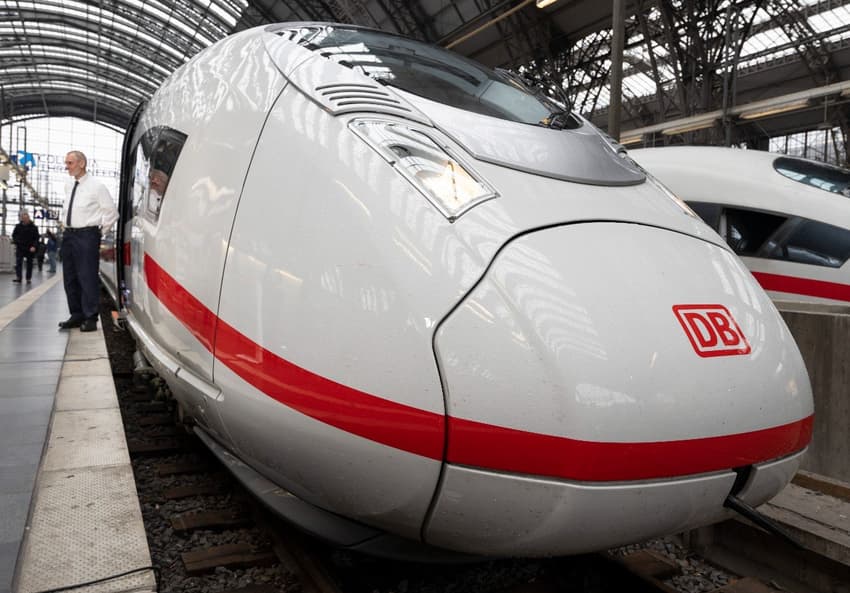How one simple rule could help German trains arrive on time

Punctuality has been a major issue for Deutsche Bahn in recent years, and the pandemic only made things worse. But could rejigging staff bonuses be the answer to a slick and efficient train service in Germany?
According to recent reports, Deutsche Bahn is set to hit a new low on its punctuality targets this year.
From January to November, only 65.6 percent - just under two thirds . of long-distance trains arrived on time. In the summer months of July to August, punctuality fell below 60 percent.
Revamping the rail service and making it more attractive to those who might otherwise drive has been a key challenge for the government.
Now it appears the traffic-light coalition of the Social Democrats (SPD), Greens, and Free Democrats (FDP) have come up with a solution.
READ ALSO: How Germany plans to make trains more punctual
In the future, the bonuses doled out to Deutsche Bahn's top management will be linked to the punctuality of trains and customer satisfaction. As reported by The Pioneer, the board of directors will receive a bonus next year if 75.2 percent of long-distance trains arrive on time. For regional trains, the target is 94 percent, while for freight services it's 69 percent.
They will also need to offer an all-round better experience for customers in order to rake in some extra cash each year. A customer satisfaction rating of at least 70 percent is set to be among the conditions for receiving the bonus.
Statistics released this year suggest the rail operator is a long way off these targets. In some regions and during certain times of year, less than half of trains arrived at their destination on time. In the three summer months, when the popular €9 ticket deal was running, more than one in five long-distance trains was more than 15 minutes late. In September and October, more trains were on time, but this progress appears to have evaporated in November.
Deutsche Bahn considers a long-distance train to be on time if it arrives at the station less than six minutes late. In November this year, 61.1 percent of long-distance trains were on time: more than 14 percentage points below the bonus target of 75.2 percent.
READ ALSO: OPINION: The shocking state of German trains exposes the myth of punctuality
Last year, Deutsche Bahn's eight-member executive board waived its variable compensation, according to its 2021 annual report. In fixed remuneration, however, Deutsche Bahn CEO Richard Lutz earned €900,000, while freight transport board member Sigrid Nikutta received €400,000.
These hefty pay packets place both above Olaf Scholz (SPD) in salary rankings. The current Chancellor of Germany takes home around €240,000 per year.
Comments (1)
See Also
According to recent reports, Deutsche Bahn is set to hit a new low on its punctuality targets this year.
From January to November, only 65.6 percent - just under two thirds . of long-distance trains arrived on time. In the summer months of July to August, punctuality fell below 60 percent.
Revamping the rail service and making it more attractive to those who might otherwise drive has been a key challenge for the government.
Now it appears the traffic-light coalition of the Social Democrats (SPD), Greens, and Free Democrats (FDP) have come up with a solution.
READ ALSO: How Germany plans to make trains more punctual
In the future, the bonuses doled out to Deutsche Bahn's top management will be linked to the punctuality of trains and customer satisfaction. As reported by The Pioneer, the board of directors will receive a bonus next year if 75.2 percent of long-distance trains arrive on time. For regional trains, the target is 94 percent, while for freight services it's 69 percent.
They will also need to offer an all-round better experience for customers in order to rake in some extra cash each year. A customer satisfaction rating of at least 70 percent is set to be among the conditions for receiving the bonus.
Statistics released this year suggest the rail operator is a long way off these targets. In some regions and during certain times of year, less than half of trains arrived at their destination on time. In the three summer months, when the popular €9 ticket deal was running, more than one in five long-distance trains was more than 15 minutes late. In September and October, more trains were on time, but this progress appears to have evaporated in November.
Deutsche Bahn considers a long-distance train to be on time if it arrives at the station less than six minutes late. In November this year, 61.1 percent of long-distance trains were on time: more than 14 percentage points below the bonus target of 75.2 percent.
READ ALSO: OPINION: The shocking state of German trains exposes the myth of punctuality
Last year, Deutsche Bahn's eight-member executive board waived its variable compensation, according to its 2021 annual report. In fixed remuneration, however, Deutsche Bahn CEO Richard Lutz earned €900,000, while freight transport board member Sigrid Nikutta received €400,000.
These hefty pay packets place both above Olaf Scholz (SPD) in salary rankings. The current Chancellor of Germany takes home around €240,000 per year.
Join the conversation in our comments section below. Share your own views and experience and if you have a question or suggestion for our journalists then email us at [email protected].
Please keep comments civil, constructive and on topic – and make sure to read our terms of use before getting involved.
Please log in here to leave a comment.